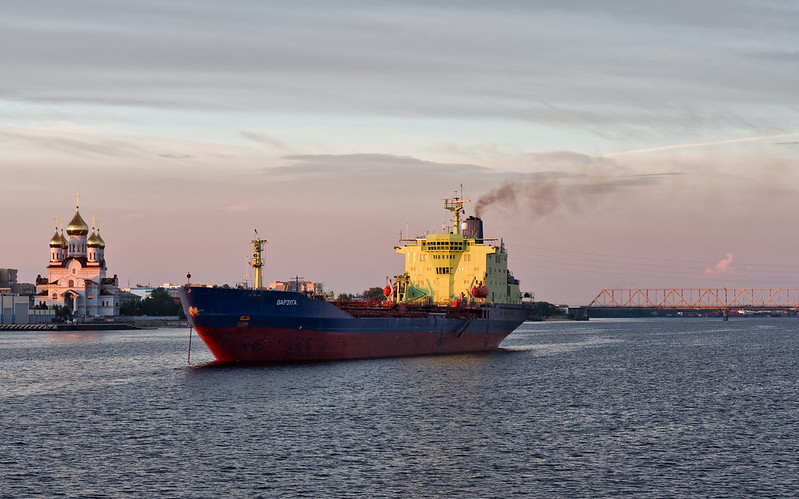 Russian Oil Tanker, photo courtesy of Alexxx Malev/Flickr
Russian Oil Tanker, photo courtesy of Alexxx Malev/Flickr
Assessing the G7 Price Cap on Russian Oil
At their most recent meeting, the G7 announced a new measure capping the price that participating countries would pay for Russian oil. This price cap would impair Russia’s ability to fund its war in Ukraine and relieve price pressure on global energy markets. However, there are two problems regarding implementation and overall effectiveness: the significant bureaucratic constraints on efforts to control Russian oil prices and the challenge of getting other major energy importers to cooperate. Indeed, the difficulty of verifying adherence to the price cap necessitates the participation of many countries beyond the G7 and its key partners.
Unlike natural gas, which Russia primarily delivers through fixed pipelines, oil can be easily redirected to new customers. Since February, the destinations for Russia’s oil have shifted significantly as European demand has shrunk and exports to newer buyers have increased. Russia can simply redirect oil exports if there are willing buyers. Given the global demand for oil, Russia could almost certainly find buyers willing to pay market prices even after the price cap is implemented. Moreover, the methods for implementing the price cap leave many doors open for Russia to sneak its exports onto world markets while bypassing the cap. Russia has vowed not to sell below the cap but it has also sold its oil at a discount in recent months, although still well above the likely price cap. This makes it probable that countries will try to circumvent any restrictions.
Currently, the onus for verification seems to fall on the insurance companies and banks providing financing. However, bankers and insurance companies have shown doubts regarding the feasibility of verifying prices. Buyers trying to circumvent the price cap could try to hide the oil’s point of origin, obtain letters of credit from multiple banks, or simply lie about the amount they are paying. The implementation strategy also assumes the near total dominance of G7 countries in sectors like insurance, but since February Russia has been building its own insurance network. Other countries could also step in to fill any gaps.
Given the difficulties of bureaucratic implementation, an effective price cap would need the support of major economies outside the G7 and its close partners, most importantly China and India. However, neither country has indicated any intention to cooperate. Indeed, China has already ruled out participation. Both countries have increased their purchases of Russian oil since February, and India has probably been reselling its excess purchases to sanctioning countries at a markup. Other countries such as Malaysia have likely also adopted this strategy. While India says it will examine the proposal, Prime Minister Narendra Modi has expressed interest in strengthening ties with Russia, including expanding energy purchases. Cooperation thus seems unlikely.
The price cap is also unlikely to attract the support of any other major economies. Of the G20 states, only half have imposed sanctions against Russia. Brazil and South Africa, two members of the BRICS group of major developing economies, of which Russia is also a member, have refrained from condemning Russia’s invasion of Ukraine or imposing sanctions. Both have also expressed interest in starting or increasing imports of Russian energy. Turkey, another G20 member, has already more than doubled its purchases of Russian oil this year.
China and India could try to use the price cap to negotiate extremely low oil prices from Russia. However, this is unlikely. Putin will not export at a price that does not allow him to continue his invasion. Moreover, there is little difference in profit between the cap and stopping exports. When faced with a choice between strategic goals and the Russian economy, Putin has unfailingly chosen the former. The invasion of Ukraine and the current economic situation in Russia show this. Moreover, were Putin to withdraw Russian oil from the market, the resulting price shock would likely force countries to buy at market price. Moreover, given that both China and India have expanded relations with Russia, even following Putin’s invasion, they are unlikely to poison their long-term relations for short-term prices.
Both these issues represent fundamental weaknesses with the G7 proposal. Any efforts to significantly reduce Russia’s ability to profit from its energy resources will likely either be ineffective or, in a worst-case scenario, will cause a massive price spike as Russia responds by weaponizing its oil exports, as it has already done with gas. The U.S. and its partners should therefore focus more on supporting Ukraine with further weapons and financial aid in order to ensure Russia’s defeat on the battlefield.
Image license under creative commons





